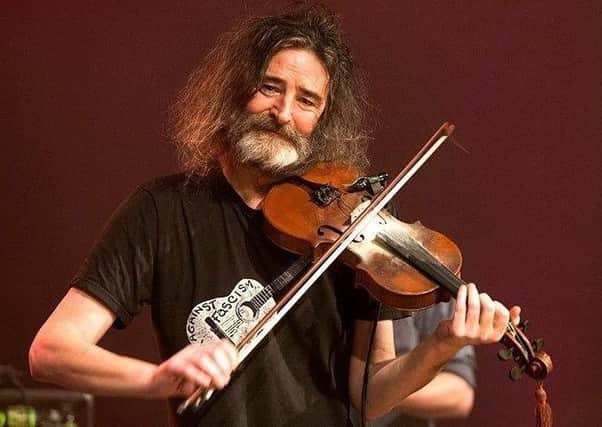Obituary: Angus R Grant, Shooglenifty fiddler who helped create folk-fusion '˜acid croft'


Angus R Grant was the unmistakeably hirsute front-line fiddler of the hugely popular and ground-breaking Scottish band Shooglenifty. A player steeped in the music of his native west Highlands – not least through family – he infused it with contemporary influences to help create the folk-fusion genre that became known as “acid croft”.
Shooglenifty’s groove-driven exuberance and trance-dance rhythms, their quicksilver fiddle and mandolin lead couched in ringing guitars, insistent drum rhythms and flickering electronics, have energised audiences as far apart as Glasgow’s Celtic Connections and Sydney Opera House. Grant, however, remained as happy playing in a pub session in Glenuig as he was in a rain forest festival in Borneo.
Advertisement
Hide AdAdvertisement
Hide AdHighland fiddle music was in Grant’s blood. He grew up in Caol, just outside Fort William, the son of the renowned left-handed Lochaber fiddler and teacher Aonghas Grant and his wife Moira. He was given his first fiddle – a quarter-sized model – by an uncle when he was just four, and according to family lore he was playing tunes on it within a few days.
He attended Lochyside Primary School (where his brightness impressed his teacher, Joan Mackintosh, aunt of his future Shooglenifty colleague and drummer, James Mackintosh), then Lochaber High. It was at school that he met up with long-standing friends and future musical associates Kaela Rowan, who would later make her reputation with bands such as Mouth Music and sing on Shooglenifty’s last album, The Untied Knot, and Rowan’s future husband, drummer Mackintosh.
Initially the young Grant seemed set on the same musical path as his father, as he played with him at dances and ceilidhs around the Highlands. Teenage rebellion, however, saw him exchange fiddle for electric guitar and embark on a flirtation with punk rock. He was persuaded to take up his fiddle again and start playing sessions, and before long he and Rowan had been recruited by another well-known young Highland fiddler, Iain MacFarlane, into his trio Pennycroft in playing around the pubs of Lochaber.
Mackintosh and his sister Fiona headed south to art school in Edinburgh, and Grant followed them, discovering a lively and eclectic music scene. He embarked on the first of several busking trips to the Continent, including a visit to Spain that inspired one of his best known tunes with Shooglenifty, Two Fifty to Vigo. Returning to the rumbustiously creative Edinburgh music crucible of the late Eighties, he and Mackintosh joined guitarist Malcolm Crosbie, Orcadian banjo player Garry Finlayson and bassist Conrad Molleson in the punk-bluegrass outfit Swamptrash.
When Swamptrash disbanded in 1990, Grant, Mackintosh and Crosbie headed off to busk in Spain where, according to Mackintosh, the name Shooglenifty was coined, when a bar offered them a gig but insisted they had a name to put on the bill. It was Crosbie who came up with “Shooglenifty”, not without some consternation from the others.
Back in Edinburgh, the emergent band, joined by mandolinist Iain Macleod, started honing their distinctive sound, initially in Christie’s pub in the West Port then in La Belle Angele further down the Cowgate.
When their first album, Venus in Tweeds (its title track composed by Grant), was released by the folk label Greentrax in 1994, it had an immense impact, on the folk scene and beyond, as well as becoming the label’s best-seller and BBC Radio Scotland Album of the Year. They would go on to make six other albums – their seventh, last year’s The Untied Knot, marked their 25th anniversary and featured sleeve artwork by the celebrated artist and playwright John Byrne.
As the Celtic and world music scene clamoured for a sound that was labelled “acid croft”, “dub ceilidh” or even “druidic funk” by pundits struggling to pigeonhole their distinctive fusion of Celtic and clubland, Angus and company took the stage at such major gatherings as Celtic Connections, Glastonbury and Womad, as well as such further flung and sometimes unlikely sounding locations as Australia, Borneo and Rajasthan. Grant found himself trading tunes with South African choirs and Rajasthani Manganiyar musicians and, in Japan, conversing with the ceremonially robed daughter of the emperor after playing at the British High Commission in Tokyo.
Advertisement
Hide AdAdvertisement
Hide AdThey were led, as always, by that mercurial pairing of fiddle and mandolin. When Macleod left the band in 2002 he was replaced by Luke Plumb from Tasmania, with whom Angus enjoyed a particularly strong musical relationship over 12 years, also making several albums with him and singer Peter Daffy in the Celtic-bluegrass fusion of the Funky String Band. Following Plumb’s departure in 20014, he went on to develop another warm playing partnership with the band’s current mandolinist, Ewan MacPherson.
Throughout it all, Grant’s fiddle led the way, his style forged in Lochaber but reflecting eclectic musical tastes which ranged from Martin Hayes and Planxty to Little Feat and the Grateful Dead. “The one thing a lot of people might not know about Angus is that he was amazing at slow airs, and he had a whole encyclopaedia of tunes that would come out in sessions,” says Mackintosh. “There was something unquantifiable about his playing.”
Mackintosh describes Grant as “a private man. He didn’t use a mobile phone or any modern technology. He just did his thing. He loved the west coast and he’d spend as much time up there as possible. He would just love to go and play a tune in Arisaig or Glenuig, or go out to Eigg. For Angus, everyone who played in the band just became family to him.”
Having died after a short battle with cancer, Grant is survived by his father Aonghas and mother Moira, sisters Fiona and Deirdre and his niece (and music pupil) Eva.
JIM GILCHRIST